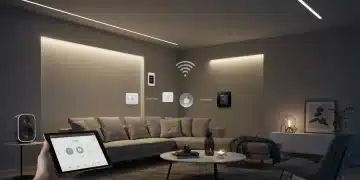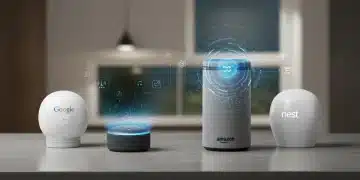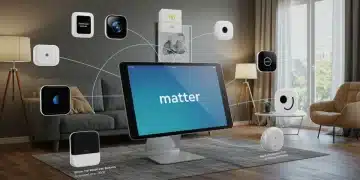The Latest Smart Home Security Cameras: Features, Performance, and Analysis
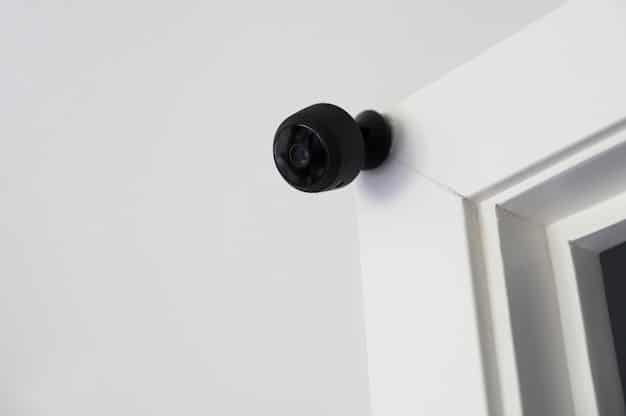
The latest smart home security cameras offer advanced features such as AI-powered detection, cloud storage, and seamless integration with other smart devices, enhancing overall home security and convenience.
In today’s world, ensuring the safety and security of our homes has become a top priority. The advancements in technology have brought us sophisticated solutions, and among them, the latest smart home security cameras: features and performance analysis stands out as a crucial component. These cameras offer a blend of convenience, advanced features, and enhanced security, making them an essential part of any modern home.
Understanding Smart Home Security Cameras
Smart home security cameras are rapidly evolving. They’re no longer just about recording footage; they incorporate advanced technology that provides real-time monitoring, smart alerts, and seamless integration with other smart home devices. This section explores the core aspects of these cameras.
Key Features of Smart Security Cameras
The functionality of smart security cameras extends beyond basic video recording. Here’s a glimpse into what makes them stand out:
- High-Definition Video Quality: Capturing clear footage is essential for identifying details. Many cameras offer 1080p or even 4K resolution.
- Night Vision: Infrared or enhanced low-light capabilities ensure visibility in dark conditions.
- Motion Detection: Advanced sensors detect movement and trigger alerts, reducing false alarms.
Benefits of Integrating Smart Cameras
The advantages of using smart security cameras are numerous. They offer peace of mind and convenience in managing home security:
- Remote Monitoring: Watch live footage from anywhere using a smartphone or tablet.
- Two-Way Audio: Communicate with visitors or deter potential intruders.
- Cloud Storage: Securely store recorded video in the cloud for later review.
In summary, understanding the features and benefits of smart security cameras is fundamental for making informed decisions about your home security setup.
Top Brands and Models in 2024/2025
Choosing the right security camera can be daunting given the vast array of options. Several brands have distinguished themselves through innovation and reliability. This section highlights some of the top brands and models available in 2024/2025.
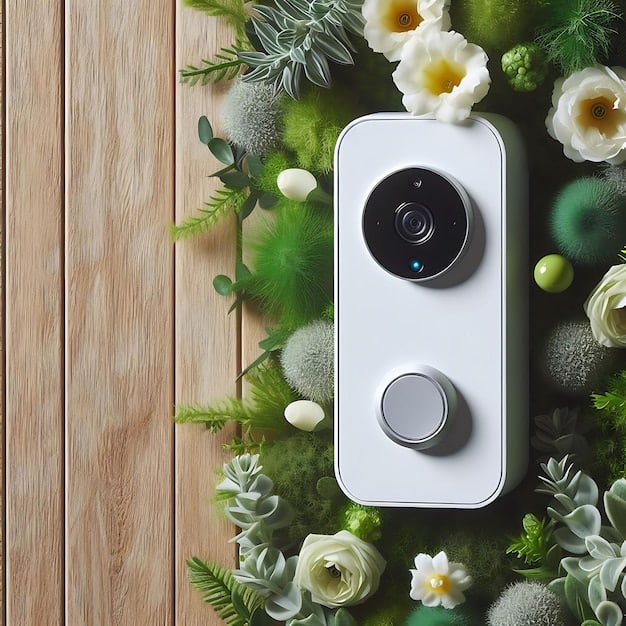
Leading Smart Camera Brands
Here are some of the brands leading the smart security camera market:
- Nest: Known for user-friendly interfaces and seamless integration with Google Home.
- Arlo: Offers a range of wireless options with excellent video quality and advanced features.
- Ring: Popular for its doorbell cameras and comprehensive security systems integrated with Amazon Alexa.
Spotlight on Specific Models
Let’s explore a few standout models that have garnered positive reviews:
- Google Nest Cam (battery): Offers versatile placement options and smart alerts.
- Arlo Pro 4: Features 2K HDR video, a wide 160-degree view, and integrated spotlight.
- Ring Spotlight Cam Battery: Provides motion-activated recording and customizable motion zones.
Selecting a camera from a reputable brand and considering specific model features can significantly enhance your home security.
Analyzing Camera Features: What Matters Most?
With numerous features available in smart security cameras, it’s crucial to identify which ones are most impactful for your specific needs. This section dissects the critical features that significantly influence camera performance and usability.
Video Quality and Field of View
Video quality and field of view are essential for comprehensive surveillance. They determine how clearly and broadly you can view your surroundings:
- Resolution: Higher resolution (1080p or 4K) provides sharper, more detailed images.
- Field of View: A wider field of view (120 degrees or more) captures more of the surrounding area.
- HDR: High Dynamic Range enhances video quality in high-contrast lighting conditions.
Smart Detection and Alerts
Intelligent detection features minimize false alarms and provide relevant notifications:
- Person Detection: Distinguishes between humans and other objects to reduce false alerts.
- Facial Recognition: Identifies known individuals, providing personalized notifications.
- Package Detection: Alerts you when a package is delivered to your doorstep.
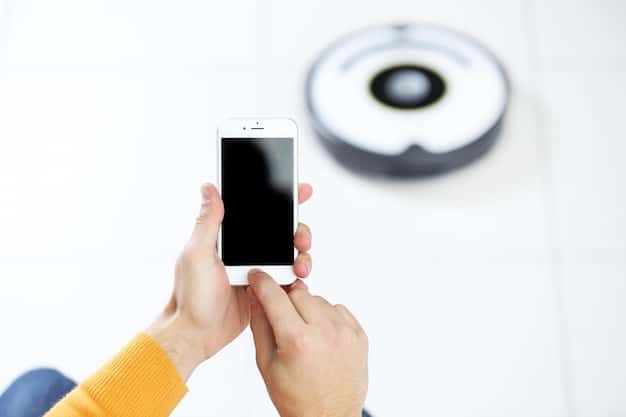
Prioritizing these features can greatly improve the effectiveness and convenience of your smart security setup.
Performance Metrics: Evaluating Camera Effectiveness
Evaluating the performance of a smart security camera involves considering several key metrics. This section delves into the factors that determine how well a camera performs under various conditions.
Factors Affecting Performance
Several technical and environmental factors influence camera performance:
- Wi-Fi Connectivity: Stable and strong Wi-Fi is crucial for reliable video streaming and recording.
- Battery Life: For wireless cameras, longer battery life reduces the need for frequent recharging.
- Weather Resistance: Outdoor cameras must withstand various weather conditions (rain, snow, heat).
Real-World Testing Scenarios
In real-world scenarios, cameras should perform consistently:
- Daytime Clarity: Assess video quality in bright daylight conditions.
- Nighttime Performance: Evaluate visibility and clarity in low-light or completely dark environments.
- Motion Detection Accuracy: Test how effectively the camera detects and alerts you to relevant movement.
By considering these performance metrics, you can ensure your security camera meets your expectations and provides reliable protection.
Setting Up and Managing Your Smart Camera System
Proper setup and management are vital for maximizing the benefits of your smart security camera system. This section provides guidance on installation, configuration, and ongoing maintenance.
Installation Tips
Effective installation can improve camera coverage and deter potential intruders:
- Strategic Placement: Position cameras to cover entry points, driveways, and vulnerable areas.
- Secure Mounting: Ensure cameras are securely mounted to prevent tampering or theft.
- Optimized Viewing Angles: Adjust the camera angle to eliminate blind spots and maximize visibility.
Software and App Management
Managing your camera system through software and apps is essential for customization and control:
- Customization: Adjust settings such as motion sensitivity, recording schedules, and notification preferences.
- Firmware Updates: Keep the camera software updated to benefit from the latest features and security patches.
- Cloud Storage Management: Efficiently manage and organize recorded video clips in the cloud.
By following these setup and management tips, you can ensure your smart camera system operates smoothly and effectively.
Privacy and Security Considerations
While smart home security cameras provide enhanced safety and convenience, it’s important to be mindful of privacy and security concerns. This section addresses these considerations, offering practices to protect your data and maintain your privacy.
Protecting Your Privacy
Protecting your privacy involves several key steps to ensure your camera isn’t misused.
- Secure Your Wi-Fi Network: A strong, password-protected Wi-Fi network is the first line of defense against unauthorized access.
- Use Strong Passwords: Use unique, complex passwords for your camera accounts to prevent hacking.
- Enable Two-Factor Authentication: Add an extra layer of security by requiring a second verification method, such as a code sent to your phone.
Data Security Measures
Implement data security measures to ensure your recorded footage and personal information are well-protected.
- Review Privacy Policies: Understand how your camera provider collects, uses, and protects your data.
- Encrypt Video Footage: Ensure your camera offers encryption to protect your videos from unauthorized access.
- Limit Cloud Storage: Store only necessary footage to reduce potential data breaches.
By integrating these privacy and security measures, you can enjoy the benefits of smart security cameras while safeguarding your personal information from potential threats.
| Key Point | Brief Description |
|---|---|
| 🔑 Key Features | HD video, night vision, and motion detection are essential. |
| 🛡️ Privacy | Secure Wi-Fi, strong passwords, and two-factor authentication are critical. |
| 📶 Connectivity | Stable Wi-Fi is a must for reliable video streaming and recording. |
| 📍 Strategic Placement | Position cameras to cover entry points and vulnerable areas. |
FAQ
▼
Aim for at least 1080p for clear and detailed video. 4K resolution provides even better clarity, but may require more bandwidth and storage.
▼
Night vision is crucial for monitoring your property in low-light conditions. Ensure the camera has infrared or enhanced low-light capabilities for clear nighttime footage.
▼
Two-factor authentication adds an extra layer of security by requiring a second verification method, such as a code sent to your phone, to access your account.
▼
Most smart security cameras require a Wi-Fi connection to transmit video footage and send alerts. Some models may offer local storage options, but real-time monitoring requires Wi-Fi.
▼
Keep your camera’s firmware updated with the latest security patches and features. Set up automatic updates if possible, or check for updates regularly.
Conclusion
In conclusion, the latest smart home security cameras: features and performance analysis reveal a diverse landscape of options, each designed to enhance your home’s safety. By understanding the key features, performance metrics, and privacy considerations, you can make an informed decision and implement a security system that meets your specific needs, providing peace of mind and a secure environment for your home.


